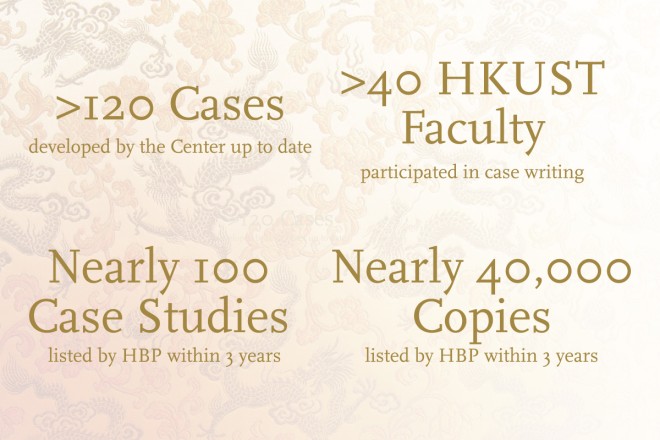[ad_1]
[Sponsored Article]
When it comes to a business education, nothing beats learning from real-life situations. Case studies are where theory intersects with real life and that people’s authentic experiences can provide valuable lessons. For this reason, case studies are held in high esteem and are valued by business educators worldwide.
Since 2018, HKUST’s Thompson Center for Business Case Studies has partnered with Harvard Business Publishing (HBP) to distribute the University’s business cases online via HBP’s case catalog. Its global distribution has now hit a record high, signaling a strong world-wide demand for HKUST case studies.
Cases into the Classroom
“Local case studies are really important for us, because we are able to bring the protagonist of the cases into the classroom. That way the students can hear some of the analysis, and also get some feedback directly from the protagonist,” says Professor Roger KING, Senior Advisor and Founding Director of the Thompson Center for Business Case Studies.
Professor King, who is also Founding Director of the HKUST’s Tanoto Center for Asian Family Business and Entrepreneurship Studies, says that these local cases including those which feature Asian family business and entrepreneurship studies add a new dimension to teaching. Asian cases are bicultural and that’s another important and unique aspect of HKUST’s case studies, he says.
“There is another reason for its importance,” says Professor Winnie Qian PENG, who is the Director of both the Thompson Center for Business Case Studies and the Tanoto Center for Asian Family Business and Entrepreneurship Studies. “Quality Asia-specific case studies are in demand.”
Professor Peng says that HKUST case studies hold incredible values, because most of them are written from the perspective of the key decision-maker and reflect real-life issues in Asia, and the region had the highest economic growth in the past decade and still has a high growth potential for the future. “More and more people in and out of Asia are interested in understanding Asian businesses and doing businesses in Asia,” Professor Peng added.
“You’re dealing with a real-life situation, with management decisions that have real consequences. So do you go left, right or straight? Through case study methods, the students get to put themselves in the shoes of the protagonist,” says Professor Michael CHEN Shih-Ta, Advisor for the Center whose previous experiences included leadership positions with the Harvard Business School Asia Pacific Research Center and the Asian Development Bank.
Hitting a New Record
The volume of cases that are being accessed from around the world demonstrates the popularity of the case studies. Over 8,000 copies of HKUST case studies were distributed to international business schools during the second quarter of 2021. This is compared to 5,000 copies in the previous quarter, making it a record high for the Center since it began the partnership with HBP. Global institutional users of the case studies include Harvard University, HEC Paris, INSEAD, the University of British Columbia, the University of California, and more.
Within just three years’ partnership with HBP, nearly 100 HKUST case studies have been listed by HBP, nearly 40,000 copies of the case studies are being used around the world, and over 40 HKUST faculty members participated in case writing so far. “The faculty has realized that students want to study these cases because of the pedagogy,” says Professor Chen.
Professor Peng adds that in recent years, she has noticed that it’s not just EMBA students who are interested in the case studies. Undergraduates and MSc students are interested too, and they’re looking to find insights by reading them. Case studies aren’t always a part of undergraduate classes. The students are very excited especially when they get to study the companies that they have heard of or have been a customer before. HKUST’s case studies are Asian focused, and that can fit the growing demand. “Asian companies are a very important element of Asian business school education,” says Professor Peng.
This is one of the key reasons why the Thompson Center for Business Case Studies started the partnership. Both Professor King and Professor Peng say they want to facilitate a better understanding of the unique cultures, management styles, ethics and business environments in Asia through Asia’s own cases. The cases cover a variety of disciplines and fields, and are compiled by expert HKUST faculty members.
“We’re a premier business school with lots of diverse, world-class faculty, and we have a great network. It gives us a great advantage,” adds Professor Chen.
HKUST’S outstanding reputation and high-quality case studies brought about the partnership with Harvard. “This is a really good opportunity to let more people around the globe learn what’s really happening in Asia. Our case center is one of the most active in existence,” says Professor Peng.

[ad_2]
Source link
